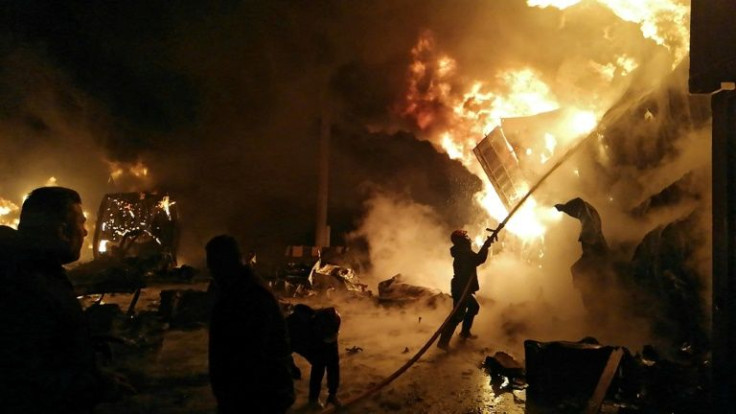Satellite Images Show Aftermath Of Israel's 'Precise' Bombing Of Syrian Port Of Latakia

A day after Israel Air Force bombed the Syrian port of Latakia allegedly targeting a shipment of "arms and munitions," satellite images show damaged containers and a thick pall of smoke over the yard.
The overall damage appears to be limited to the container terminal, and the area immediately surrounding the port appeared relatively unaffected, said a report by The Drive.
The report is based on the satellite images from Planet Labs, an American public Earth imaging company based in San Francisco.
The image does not show much cratering either, hinting at how "precise" the raid was, striking individual or small groups of containers only.
Pictures from the scene had earlier showed firefighters struggling to douse the blaze on containers. While Syrian state news media said the containers were "engine oil and spare parts for cars and other vehicles," Britain-based Syrian Observatory for Human Rights said the cargo was "arms and munitions."
The missile attack also wrecked the facades of a hospital, some residential buildings, and shops, media reports said. Though no casualties were initially reported, the latest media reports said two members of the Syrian military were killed in the raid.
Meanwhile, the air raid was reportedly connected to the arrival of the Iranian-flagged container vessel Shiba, owned by the Islamic Republic of Iran Shipping Lines.
The ship was spotted Wednesday transiting the Bosphorus (Strait of Istanbul) from Latakia to Chornomorsk in Ukraine. The vessel had unloaded a consignment of containers at Latakia two days before the airstrike, unconfirmed reports said. Shiba was recently sanctioned by the U.S. for transporting weapons for Iran.
So far, there is no response from Israel about the air raids, which is unsurprising as Tel Aviv rarely comments on such individual strikes in Syria. Last week, Israel launched cruise missiles at Damascus International airport in Syria. This reportedly was meant to thwart efforts to use the airport to fly in supplies for Iranian militia and affiliates operating in Syria and Lebanon, including Hezbollah.
However, analysts say if the air raids were indeed carried out by Israel as suggested, then they were "presumably designed mostly to prevent the buildup of [the] Iranian’s capabilities in Syria." "But there is a secondary benefit of reminding the Iranians that Israel can strike at any time," Chuck Freilich, a former deputy Israeli national security adviser, told The Wall Street Journal.
He added that the strikes would add pressure on Iran in the continuing talks in Vienna to revive the 2015 nuclear deal as the attack suggested that the "military option is open if negotiations fall through."

Photo: SANA via AFP





















